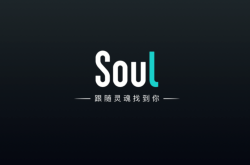Choosing College Majors: Trust Zhang Xuefeng or AI?
![]() 07/04 2024
07/04 2024
![]() 624
624
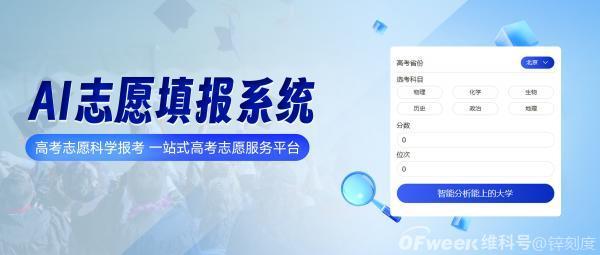
How Long Can Zhang Xuefeng's Iron Bowl Last?
Written by Meng Huiyuan
Edited by Li Jinlin
Typeset by Annalee
After the question of "how did you do on the exam?", the topic of "which college to apply to" has become a hot discussion recently.
Previously, the news that "Zhang Xuefeng's RMB 10,000 college application counseling service was snapped up, selling RMB 200 million worth of courses in just 3 hours, and even spots for 2026 have been sold out" dominated various hot lists, already indicating how strong the user demand in this sector is. In fact, this service corresponds to a huge paid market worth nearly RMB 1 billion—data shows that the number of college entrance examinees in 2024 has exceeded 13 million, reaching 13.42 million, an increase of 510,000 people from last year, making it the largest cohort ever.
It seems that Zhang Xuefeng single-handedly brought up the popularity of the entire "college application counseling" industry, but in reality, there are many other players who have been mining this field for years: not only many offline real-person volunteer counseling companies and institutions, but also powerful internet giants like Baidu, Alibaba, Tencent, and NetEase who have entered the market...
Nowadays, this rigid demand business specifically serving current college entrance examinees and their parents, with increasing public attention, has fallen into doubts of "earning high prices through information asymmetry." From online AI college application counseling services priced as low as a few hundred yuan or even some free ones, to offline real-person college application counseling courses priced at thousands of yuan, the "man vs. machine battle" has begun.
Zhang Xuefeng's "Cheaper Alternative" is More Cost-Effective
Under the influence of the mainstream view of "30% exam, 70% application," Chang Yu, a parent of a current college entrance examinee, could not escape the trend. However, after comparing the prices of offline courses ranging from thousands to tens of thousands of yuan, he decisively chose a free online AI college application counseling service.
"The biggest experience is that it improves the efficiency of screening. In the past, I relied on the experience of teachers and senior students, but now having an auxiliary tool is a convenience brought by technology." Chang Yu is from Hebei, and this time his daughter scored 545 points. Immediately after the scores were released, he used the AI college application service. "After entering the numbers, rankings, and her exam subjects, I got three levels of recommendations: one for high-probability schools, one for relatively stable schools, and one as a backup. Then we screened from within those options."
"Honestly, without this data estimation, I wouldn't have known which schools she could enter with this score. Choosing from a nationwide perspective is like looking for a needle in a haystack, the volume is too large." Of course, his primary purpose is to choose a major that will lead to good employment after graduation, while also considering his daughter's interests and career development plans to make a judgment. "After excluding law and philosophy, which my daughter doesn't like and have poor employment prospects, we finally narrowed it down to Tianjin University of Sport and Sichuan International Studies University."
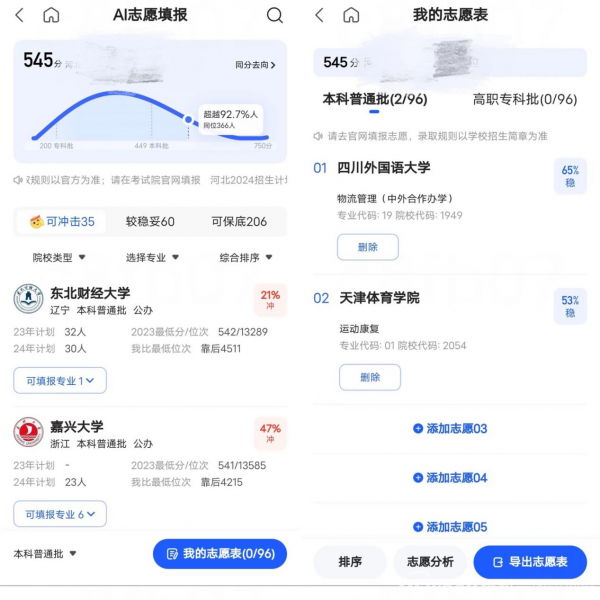
Chang Yu's daughter filled out her college application form based on the search results.
The next step was simpler. After initially selecting the targets, Chang Yu's daughter called these two institutions separately to inquire if her score was stable. "They said her scores were fine, and she was overjoyed."
The Lin family was different. Their goal this year was very clear: they wanted to aim for their daughter's dream school, Communication University of China. "I contacted someone who called the admissions office of CUC and was told that my daughter's scores were a bit iffy, but not completely hopeless, which was quite awkward." Therefore, Lin Yuan had to prepare for both possibilities. "Finally, I used the AI college application service to input her scores and it recommended the communication-related major at Beijing Language and Culture University as a backup, just in case she couldn't get into CUC."
"Like our child, some people have a very clear idea of which school and major they want to go to, but nothing is 100% certain, so filling out the second and third volunteer slots is crucial," Lin Yuan believes that online AI college application services can initially screen out a result, and then after confirming the details with the admissions office, parents and children can feel more confident about their choices. "This really helps streamline the process. Otherwise, you couldn't possibly call every university's admissions office before the application deadline to ask if the scores are enough."
As evidenced by the above parents' personal experiences, Zinc Dimension found that compared to traditional offline real-person one-on-one college application counseling, or Zhang Xuefeng, who has gained fame in the college application sector in recent years, online AI college application services have entered the视野 of many parents with their advantages of low prices (some even free), convenience, and speed. Quite a few people have directly regarded them as a "cheaper alternative" to expensive offline volunteer information services.
However, there is a slight difference in the underlying logic of the two services. The former, whether it's Zhang Xuefeng or other paid real-person volunteer counseling services, will provide specific college application recommendations after comprehensively analyzing factors such as the candidate's scores, preferences, employment environment, and school requirements. The latter is various online AI college application-related services that can analyze which score tier the candidate falls into based on a large amount of data such as school cut-off scores and past admission rates, presenting various possibilities of rushing, stabilizing, and safeguarding to users, allowing parents and candidates to choose for themselves. It is more of an information aggregation service.
Can AI Replace Human in Filling Out College Applications?
Currently, AI's participation in various industries is unprecedented. Although many parents have personally experienced college application services empowered by AI technology, can it replace humans in filling out college applications?
After experiencing multiple AI college application systems on the market, Zinc Dimension obtained a general guide: simply enter the candidate's personal information such as the province they took the college entrance exam in, the subjects they took, and their specific scores into the AI college application system, and the system will arrange a list of "reachable," "stable," and "safe" schools and majors accordingly, assisting candidates in completing their college applications.
In other words, the final decision still lies with humans, and the AI college application system is merely a tool for screening information.
To give a most intuitive example, like Chang Yu and Lin Yuan, many parents and candidates, after selecting their target schools and majors through the AI college application system, will still carefully study the admission plans of those schools and contact the admissions offices of those schools for consultation before applying, to avoid being rejected due to slightly lower scores or not meeting special requirements such as height or vision.
However, the existence of this tool and its continuous iteration in the future are very necessary. Behind internet giants using AI technology to accelerate their layout in the college application sector, it cannot be ignored that the latest developments of relevant departments have actually pointed the direction for the industry to some extent.
This year, the Ministry of Education has opened the "Sunshine Volunteer" information service system for free to college entrance examinees. It is reported to be based on big data such as admissions, employment, surveys, and assessments, combined with in-depth professional and career interpretations, providing services such as volunteer recommendations, professional introductions, psychological assessments, employment destinations, and career prospects inquiries.
At the same time, various provincial college entrance examination agencies have developed and improved volunteer application information service systems based on actual conditions, which are also open to candidates for free, providing authoritative services such as previous years' admission data, current year's plan data inquiry services, and volunteer recommendations based on individual needs.
A major premise is that every year during the college entrance exam season, the Ministry of Education will issue warnings about precautions against scams such as "high-priced college application guidance." Recently, as information about "pitfalls" and "avoiding traps" in some expensive college application services on the market has been widely disseminated, the Ministry of Education has once again issued a document reminding candidates and parents to be cautious. "The so-called 'internal big data' that some institutions or individuals claim can 'accurately position' candidates is actually just statistical summary data released by provincial admissions agencies before each year's college application period."
Obviously, the biggest benefit of internet companies entering the market with AI technology is that it brings down prices. After all, compared to offline college application service agencies priced at thousands to tens of thousands of yuan, as well as Zhang Xuefeng's nearly RMB 18,000 "Dream Card" for college application counseling, online AI college application services priced as low as a few hundred yuan and even some free ones, how can one not exclaim "this is really good"?
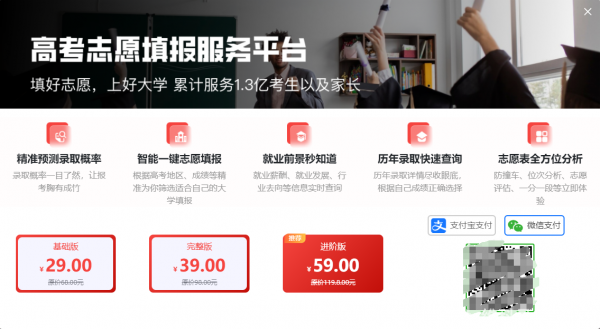
Even if there is a fee, it won't be too high.
According to the person in charge of the intelligent big model product at Sogou Input Method, the core of online AI services is to make up for the lack of professional information through one-stop professional data and experience, i.e., eliminating information asymmetry. Therefore, Sogou Input Method has launched the "University Major Assistant" in the "AI Dialogue" function based on the intelligent Wangzai product, allowing users to gradually understand university-related major content, employment prospects, suitability, and other information through chat dialogue, providing assistance to users.
However, the added value of offline services is providing emotional value and support for personalized needs, serving users' psychological needs to enhance transaction trust. Only the final customized supplementation, through personal explanation and answering questions, satisfies personalized demands, which belongs to the premium part.
Therefore, it can be said that AI college application services can achieve the integration and basic screening of relevant information, but they cannot completely replace human services for meeting emotional value and personalized needs.
What is the Result of the "Man vs. Machine Battle"?
"Our understanding of data, the integrity of data, and better application of new technologies on these data." Regarding the accumulation and iteration of technology, Xia Yatong, the product manager of Quark APP, told Zinc Dimension that it can be divided into two parts: first, the accuracy and comprehensiveness of basic data, which requires increased investment in technology, systems, and computing resources. At the same time, there will also be a team of human annotators responsible for relevant data processing and organization; second, as more users accumulate, the system will gain more insights into user interests, understanding what different provinces and different score ranges of users want. Ultimately, based on historical user data, it will provide better references for current users.
The person in charge of Tencent QQ Browser told Zinc Dimension that AI college application counseling mines official historical college entrance exam data to form a structured knowledge graph in the college entrance exam field, making probability predictions based on big data. "It's like digitizing thick college application books, greatly improving the efficiency of candidates in collecting and screening information. However, these are just references, and ultimately, candidates and parents need to make decisions based on their own situations."
In a sense, college application counseling is indeed a very difficult task to standardize the results. Its essence is a test of parents' and candidates' comprehensive cognition of themselves and the school, as well as their corresponding ability to collect and organize information, which naturally carries a lot of personalization and uncertainty.
Currently, relevant online products on the market focus more on how to use big data and AI to achieve one-stop information acquisition and provide recommendations based on historical data and users' scores, helping users make decisions more efficiently through data. The key is that parents' and candidates' cognitive issues cannot be simply solved through data and also need to conform to the general process and logic of people's cognitive accumulation.
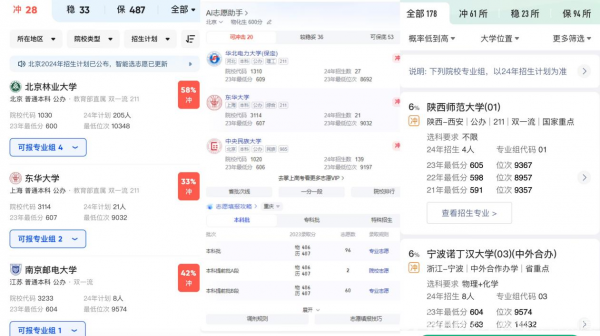
Zinc Dimension's search results
Therefore, for one of the most concerning issues for users, namely the accuracy of estimating colleges, the next step for AI technology to deeply intervene may be, like offline real-person services, to gradually understand relevant information through chat dialogue with users, providing benign complementarity to big data information support.
For example, some candidates and parents may be concerned about national special plans, local special plans, and university special plans. All three are called special plans, but what are the differences between them? Then AI searches need to automatically collect high-quality content from the entire internet and extract an accurate answer from it. Even while looking for high-quality content, it will focus on finding content from more official and authoritative sites such as the Ministry of Education, exam authorities' official websites, and various universities' official websites, obtaining relatively more accurate and credible answers, ultimately better addressing user needs.
In terms of personalized needs, if a candidate from a specific province with a specific score wants to know which major to study, which type of university to attend, or which industry to work in the future, they can simply express these needs in the search. Then, AI search will recommend schools based on certain conditions and provide reasons for the recommendations, "letting users know not only which schools they can apply to based on their scores and needs, but also what are the strengths and characteristics of those schools and why they are suitable for them."
But regardless of the next evolution direction of technology, in this new market and new race of college application counseling, the result of the "man vs. machine battle" will be to make technology accessible to more people.

